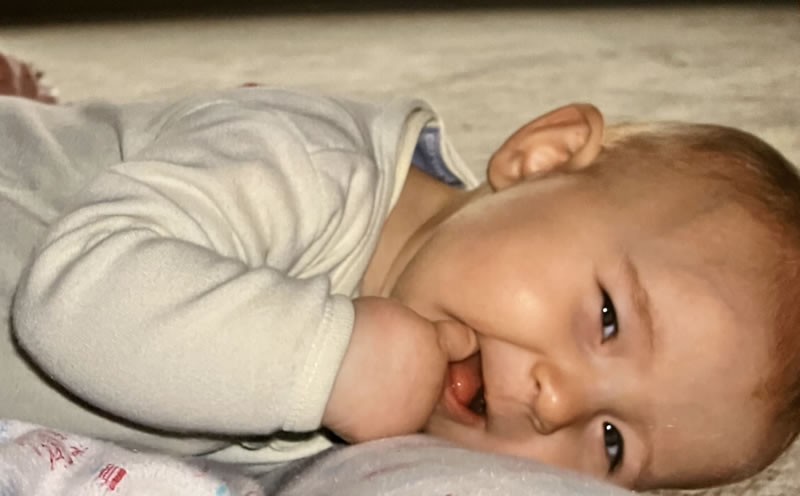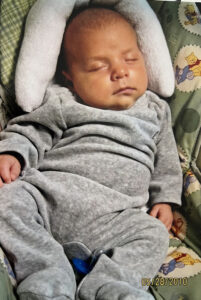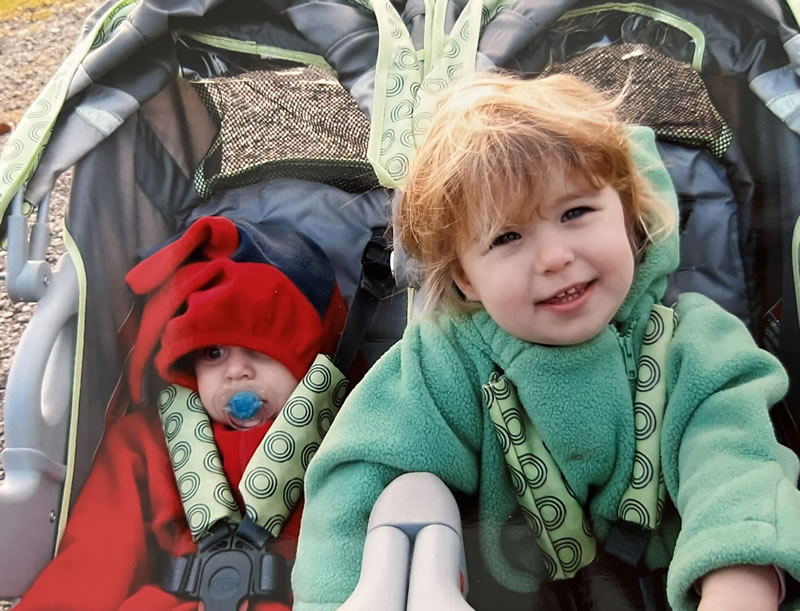 If you have kids, you probably can recall something they did or said early on in their lives that seemed quintessentially them, a moment that encapsulated their very nature. I remember visiting my in-laws one afternoon, some months after the August birth of my first child. My father-in-law was trying to make my baby smile by teasing her about her nickname (“Pumky? What kind of name is Pumky?”). She was sitting on my hip—hadn’t, in fact, even started walking or talking yet—and it was clear from her expression, she didn’t appreciate what her grandpa was saying or how he was saying it. As soon as he fell silent, she blew a raspberry. It was a gratifying reaction. You tell him, Pumky. She still has that moxie.
If you have kids, you probably can recall something they did or said early on in their lives that seemed quintessentially them, a moment that encapsulated their very nature. I remember visiting my in-laws one afternoon, some months after the August birth of my first child. My father-in-law was trying to make my baby smile by teasing her about her nickname (“Pumky? What kind of name is Pumky?”). She was sitting on my hip—hadn’t, in fact, even started walking or talking yet—and it was clear from her expression, she didn’t appreciate what her grandpa was saying or how he was saying it. As soon as he fell silent, she blew a raspberry. It was a gratifying reaction. You tell him, Pumky. She still has that moxie.
 My second child, on the other hand, has always been a bit of a softie, full of sensibility. As a baby, he’d weep if he heard songs that sounded sad. “Twinkle, Twinkle, Little Star” was too much for him. A few measures in, and his big eyes would well. I hate to admit it, but maybe once or twice, I sang some of a sad song, just to see him overwhelmed. He was so sweet! And he still is.
My second child, on the other hand, has always been a bit of a softie, full of sensibility. As a baby, he’d weep if he heard songs that sounded sad. “Twinkle, Twinkle, Little Star” was too much for him. A few measures in, and his big eyes would well. I hate to admit it, but maybe once or twice, I sang some of a sad song, just to see him overwhelmed. He was so sweet! And he still is.
I’ve been thinking about this sort of thing—definitive reactions, telling tendencies—because I’m reading an absolutely wonderful series of books by an author who is particularly adept at the fine art of characterization. “The Cazalet Chronicles” by Elizabeth Jane Howard span a decade, beginning in 1937, and explore the fortunes, passions, perturbations, and betrayals of not one character, not two, not three, but the entire sprawling Cazalet family. Plus their lovers. Servants. Good friends. And enemies. So many characters! How was I ever going to keep them straight? I needn’t have worried. Elizabeth Jane Howard was keeping them straight for me.
I’m on the third book of the series now, marveling over how deftly Howard leaps from character to character, perspective to perspective, dipping into each individual’s life at a moment that may be quiet or crackling but is invariably narratively necessary and revealing. Something I noticed yesterday was how often she begins a section without even mentioning the section’s central character by name. This is how compelling, complex, and entirely unique her characters are. Mere pronouns suffice. Particular actions, thoughts, words…they can only belong to a single individual.
The reader thinks, I know these people. This is important. To know is to care. And once readers care, they simply have to keep reading to find out what will unfold in the characters’ lives. “The Cazalet Chronicles” are addictive for this very reason.
These books are making me aware of how vital it is for writers to fully understand their characters—a prerequisite to giving readers characters worth understanding and worth worrying about. When I reflect on the times I struggled to get a story moving, I wonder now how much of the stagnation stemmed from characterization issues. Had I really figured out what my main character wanted, feared, despised, and loved? Had I given the character something to desire? Had I complicated that desire, made it sufficiently elusive, dangerously attainable, relatable, laden, fraught, grand? Had I ascertained my main character’s motives? Had I fleshed her out? Had she lived and breathed for me?

And I think about the times my stories seemed to write themselves. I bet, on those occasions, I’d done a better job of comprehending my main character’s nature and establishing what this character wanted.
An enlivened protagonist will drive a narrative. The writer can hang on for the ride.
“Where is this story going?” the stressed-out writer asks. “What am I doing? What in the world should happen next?” Is this you? Well, ask your main character. If she’s living in your imagination, she’ll answer.
“I want this to happen,” she might say.
Go ahead. Give her what she wants. Give her more than she bargained for.
“Not that,” she might say. “Anything but that.”
Hm. Give it to her anyway? See how she meets the challenge. She might surprise you.

Wonderful, as always–and super helpful as I begin revision #3 of my novel-in-progress. Thank you for your insights!
Thank you so much, Rebecca! I’m glad this post was helpful, and I hope your revisions go well! 🙂
I’m not a writer, but you make me wish I was! Your writing is just beautiful, thank you for sharing this piece. 💕
Karen, you’re so sweet! Thank you for these kind words! xoxo